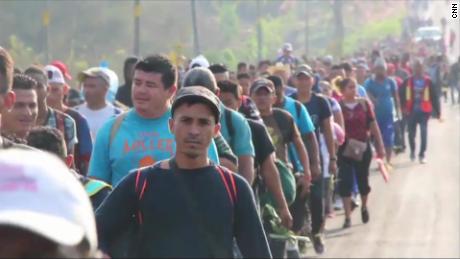Puebla, Mexico (CNN)US President Donald Trump's move to deploy the National Guard has not deterred a caravan of Central American migrants planning to cross through Mexico to the US border. Instead, the migrants will disperse into smaller groups after reaching Mexico City.
While some will stay in Mexico to try to get refugee status there, others say they will continue north to the US border.
Organizers of the caravan estimate that some 200 or so people will proceed all the way to the US border in the coming days, although the number could be higher. Last year, about 150 went all the way to the border, they said.
Pueblo Sin Fronteras caravan, which translates to "people without borders," has organized the event for years to raise awareness about the danger of the journey. The caravan has always dispersed into separate, smaller groups at some point along the route. This year's event has the largest number of participants ever, with more than 1,100.
The images of the throngs of migrants making their way north caught the attention of President Trump this week, who fumed about the caravan and what he calls weak border laws in the United States. He signed a memorandum to deploy the National Guard to the southwest border on Wednesday, one day after threatening to cut US aid to Honduras because of the caravan.
Earlier this week, he threatened to dismantle the North American Free Trade Agreement if Mexico doesn't reduce the flow of immigrants coming across the southern US border, and he essentially declared that a deal with Democrats on the Deferred Action for Childhood Arrivals was dead.
In response, the President of Mexico said that his government will "never negotiate out of fear." President Enrique Pe├▒a Nieto said Mexico "will not allow negative rhetoric to define their actions."
Who are the migrants?
Members of the caravan began arriving in small groups Thursday in Puebla, a key stop in the journey. Thursday evening, a bus carrying about 60 migrants arrived. Families stepped off a bus outside Iglesia Nuestra Se├▒ora de la Asuncion cathedral, one of many churches to open their doors to the migrants.
Others arrived in Puebla earlier Thursday in cars and by other means. From Puebla, the caravan will continue to Mexico City on April 9, organizers said.
Regardless of what Trump says or does, many migrants in the caravan said they won't be deterred from heading to the US border.
Lilian Mejia is one of them and determined to get to Texas.
She left El Salvador to join the caravan and said she heard on the news that Trump is mad because of them.
"He's not poor, fighting for his family," Mejia, 25, said. "This is what he doesn't understand."
She wears a tight bun and carries a black bag containing everything she plans to take on the 2,400-mile journey from Chiapas to the US border. All she has is a purple hoodie, a second pair of sneakers and an extra pair of clothes.
She and her husband left their two sons, a 3-year-old and a 9-year-old, behind to look for work.
"I'm looking for a better life for my kids. Arrive, the goal is to arrive (in the US), work and send money to my children," Mejia said, adding there's almost no work in El Salvador and a lot of gang violence there.
She joined the caravan "because it makes things easier to make it through immigration. It seems the right way, less dangerous."
For now, she stays at a church in Puebla where other exhausted migrants lay on thin blankets, resting in a bare room adorned with a simple cross.
Poverty, violence and political unrest in their home countries forced them to make the journey, migrants say. Many are from Honduras, where organized crime fuels widespread violence and protesters recently took to the streets after a contested election.
Carlos Diaz said Thursday in Puebla that he left his family behind in Honduras. He planned to continue to the US border, with hopes of reaching North Carolina.
"In Honduras, there are few jobs," he told CNN. "The gangs are taking control."
Diaz said he would try to cross the border, even with the National Guard on patrol.
"If I'm arrested, I will be deported to my country and then I will try again," he said.
His message for President Trump: "We're coming to work and to struggle for the future of our children. He should tap into his conscience and help the migrants."
Those who seek a new life in the US often present themselves at ports of entry and are taken into custody. While they rarely succeed in winning asylum, their cases can take years to make their way through the backlogged system.
'Dangerous' to go to US
But not everyone in the caravan seeks to go to the US.
Eric Sagastume from Guatemala, says the risks are too great for him to attempt to enter the US again. He was deported 13 years ago.
When asked why he doesn't want to go all the way to the US border, Sagastume, 61, shook his head slowly and folded his glasses.
"It's a bad place for Central American people, Mexican people," he replied. "United States have a bad, bad president. This is dangerous."
He wants to remain in Mexico as its government may offer some people permission to stay on humanitarian grounds.
Sagastume would like to go to Cabo San Lucas, a popular resort city, where he could use his English skills and meet people. He wants to make some money and support his family in Guatemala.
After walking more than a week with the caravan, Sagastume is tired and weathered from the sun. But he says that people in the caravan take care of each other and share what little they have.
He remains upbeat and carries his faith -- a white, tattered Bible tucked in his pack that has traveled with him for hundreds of miles.







